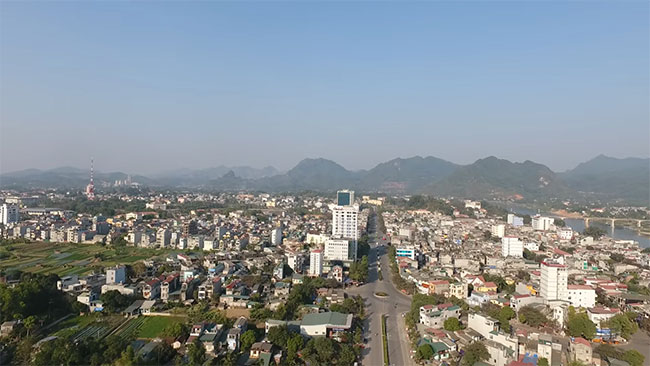|
A bird's-eye view of Tuyen Quang city |
1. Natural condition
Tuyên Quang province is 140 km far from Ha Noi to the north, locating in the middle of northeast and northwest, neighboring provinces: Hà Giang, Cao Bằng, Bắc Kạn, Thái Nguyên, Vĩnh Phúc, Phú Thọ, Yên Bái;
Natural areas: 5,867 km2.
Population: Over 760 thousand people; 22 ethnic groups (of which 50% are ethnic minor people). The province has 141 communes divided into 6 districts and one town.
Annual average precipitation: 1.295 - 2.266 mm. Average temperature: 22 Celsius degrees - 24 Celsius degrees. Average humidity/year: 81%.
2. Basic information on socio-economic development of Tuyen Quang
+ Some figures on socio-economic development in 2016:
Annual GRDP growth reached 8.0% compared to 2015; GRDP per capita reached 34 million VND/person/year; value of industrious production reached 12.204 billion VND; values of agriculture, forestry and aquaculture production reached 7.427,4 biilion VND; food grain productivity reached 350.000 tons; value of export goods reached 78.7 million USD.
With the as such results, as comparing to other provinces Tuyên Quang still faces difficulties in many aspects. So far, the province has just departed from less-developed position. Recent statistics show that its poverty rate is at 23,33%, near-poor rate is at 11,10%; some districts have their poor and near-poor rates are at high levels, for examples, the poor and near-poor rates in Lam Binh account for 66,97%, Na Hang: 57,44%, Chiem Hoa: 44,33% (followed the multi-dimensional poverty index in the period of 2016 – 2020). Through assessments, seen that endeavors for poverty reduction in many districts are far from getting sustainability and the living standard of some people in some remote areas still confronts with difficulties. Infrastructures in those poor districts have been deteriorated, whereof schools infrastructures fail to meet demands. While Tuyên Quang’s GRDP per capita reached 34 million/person/year, this is approximately 70% compared to the nation-wide average level. There are 57 out of 141 communes have been classified as special difficult areas and those of which are supported by Program 135 (in 2016) under the Prime Minister’s decision (account for 40.4% of the entire provincial communes).
3. Tuyen Quang’s potentiality and comparative advantages
Tuyen Quang has a large area of fertile agroforestry lands (agriculture land is 95.095 ha, account for 16,21%, forestry land is 446.758 ha, account for 75,28%) with a system of gravity fed irrigation. Located in tropical weather, this geographic condition is favorable for agriculture development. The province has planned focal areas of commodity productions, such as: tea area: 9,000 ha, sugar canes: 18,500 ha, orange trees: 8,500 ha, woods for paper: 130,000 ha, peanut: 4,200 ha, vegetable: 8,000 ha; forest cover: 60%. The conditions as such are good for agroforestry development, as well as agroforestry processing industry. Especially, Tuyen Quang has many kinds of agriculture products which are famous, such as: Ham Yen orange (in the top ten brandnames of Viet Nam’s fruits), other brandnames are tea, sugar which are best sold in domestic and international markets. In addition, Tuyen Quang has many rivers and streams that those are good for aquaculture of fish: Bangana lemassoni, devil catfish, Spinibarbus, naked catfishes…
|
Na Hang district where is bestowed with great landscapes |
The province has the potentiality to develop tourism. There are many types of tourism in the province, such as: historic, ecologic and spriritual tourism. Tuyen Quang has more than 500 revolutionary historic monuments, many pagodas and is a place of instauration, convergence and crossing of cultural identities with unique festivals, folk music and dances remained in northern ethnic minor communities. It also has a lot of famous things, such as: a hot spring famous for health care and resort business, a hydropower lake, primitive forests containing rare species of trees and animals listed in Red List.
Tuyen Quang’s traffic system is convenient with many strategic national roads that come across the province. There are many roads that lead to Ha Noi from Tuyen Quang: Going along the National road 2 (160 km), Ha Noi – Lao Cai highway (145 km), National road 37, National road 2C (140 km). Tuyên Quang city is 120 km far from Noi Bai International Airport; 260 km from Hai Phong Port; 170 km from Thanh Thuy border gate, Ha Giang province; 207 km from Lao Cai international border gate; 220 km from Tan Thanh borgder gate, Lang Son province; 420 km from Mong Cai border gate, Quang Ninh province. These conditions are friendly for groups and companies to invest in the province.
Human resources are abundant in the province and these tend to increase every year. Provincial labor rate from the age of 15 to 60 accounts for 65.3% of the total population. The rate of trained labors was 45.8% in 2015, of which 27.5% were provided with vocational training. When Tan Trao University has been established, Tuyen Quang’s education system covers all the trainings from vocational training to specialized training, meeting the needs of qualified human resources (there are 335 high schools, 148 preschools, 1 university, 1 college, 2 technical schools, 6 centers for vocational training). This education system gives the provicne advantages in investment attraction, as well as industrialization process, sectoral restructuring and socio-economic development.
Tuyen Quang focusses on strengthening administration procedures reforms, improving investment climate to make it clear for investors. The province commits decreasing 30% of time for the obligatory administration procedures, sustaining one-stop shop mechanism in procedures of business, investment registrations, investment certification, tax, land, ensuring the publicity, transparency and strenthening responsibility of state agencies. In doing so, many enterprises have come to cooperate and invest in the province, many of which are big companies, such as: Vingroup, Muong Thanh group, Vinatex, Woodsland, etc.




